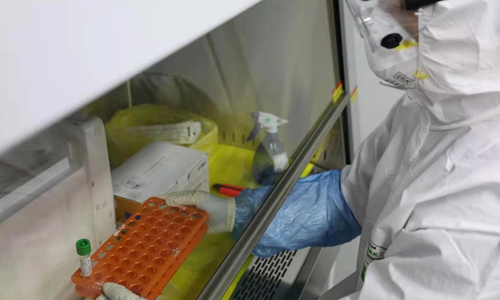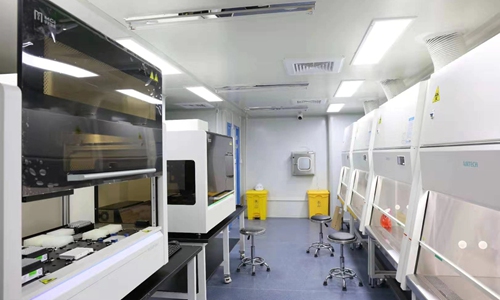HOME >> CHINA,SPECIAL-COVERAGE
Wuhan lab for virus testing starts trial operations
By Deng Xiaoci Source:Global Times Published: 2020/2/6 17:43:43

The Huo-Yan laboratory Photos: BGI

The Huo-Yan laboratory Photos: BGI
China has set up a special laboratory in Wuhan, Central China's Hubei Province, amid the ongoing novel coronavirus outbreak, aiming to carry out 10,000 tests daily of infection cases at the disease epicenter.
The special virus testing lab is named Huo-Yan, a variant of the traditional Chinese mythological term that roughly translates as "piercing eyesight," and covers an area of 2,000 square meters in Wuhan. It officially started trial operations on Wednesday, according to the lab contractor and operator, Shenzhen-listed genomics company BGI Genomics Co.
The designed testing capability for the lab, which has 12 automatic nucleic acid extractors in place, is up to 10,000 times daily, Global Times was told.
Nucleic acid testing (NAT) is seen as a key measure to determine a confirmed case of novel coronavirus infection, and to see if those in quarantine are fully recovered from the disease so that they can be discharged from hospital, according to BGI.
The construction of the special lab took only five days after the project idea was approved by local authorities on January 31.
The Huo-Yan lab will work together with the Huoshenshan Hospital, Leishenshan Hospital, and the "Fangcang" makeshift hospitals in Wuhan, by providing much-needed precision tests and clinical diagnoses for the disease in a swift and timely fashion.
BGI estimated that over 100,000 NAT tests were needed in Wuhan and across the Hubei Province .
As of Wednesday midnight, 28,018 confirmed cases of novel coronavirus infection were reported on the Chinese mainland and 563 had died. The vast majority of confirmed and suspected cases were discovered in Hubei Province.
Posted in: SOCIETY,FEATURE